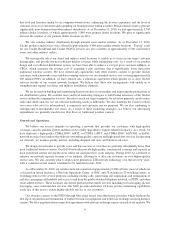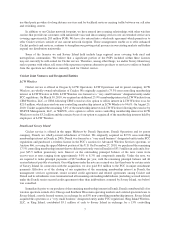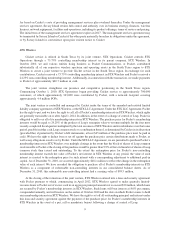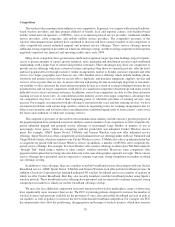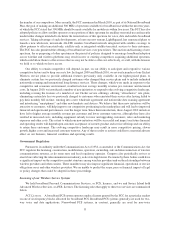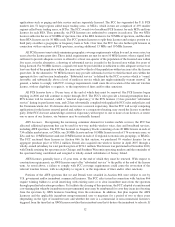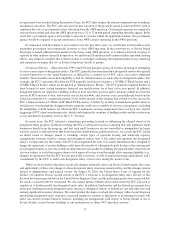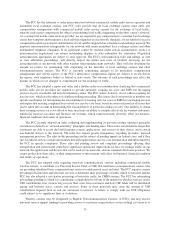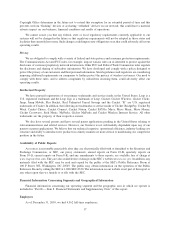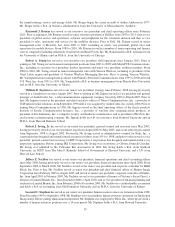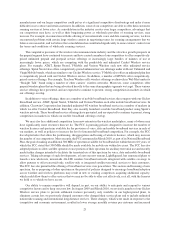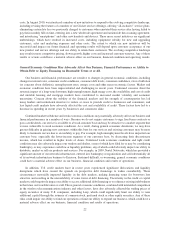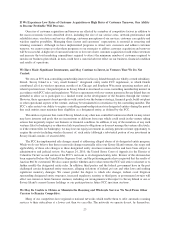Cricket Wireless 2010 Annual Report Download - page 22
Download and view the complete annual report
Please find page 22 of the 2010 Cricket Wireless annual report below. You can navigate through the pages in the report by either clicking on the pages listed below, or by using the keyword search tool below to find specific information within the annual report.certain qualifying low income customers. Certain competing wireless carriers operating in states where we operate
have obtained or applied for ETC status. Their receipt of universal service support funds may affect our competitive
status in a particular market by allowing our competitors to offer service at a lower rate or for free, subsidized by the
USF. We have obtained ETC designation in a number of states in which we provide service and have also applied or
plan to apply for ETC designation in additional states. The FCC is considering altering, reducing, or capping the
amount of universal support received by commercial mobile wireless ETC providers. In May 2008, the FCC
adopted an interim cap on payments to ETCs under the USF relating to providing wireless service in high cost areas,
pending comprehensive reform that is now under consideration by the agency. Future action by the FCC may reduce
or eliminate the amount of universal support funds we currently receive for providing wireless service in certain
qualifying high cost areas or to certain qualifying low income customers.
We also are subject, or potentially subject, to numerous additional rules and requirements, including number
pooling rules; rules governing billing, subscriber privacy and customer proprietary network information; roaming
obligations; rules that require wireless service providers to configure their networks to facilitate electronic
surveillance by law enforcement officials; rate averaging and integration requirements; rules governing spam,
telemarketing and truth-in-billing; and rules requiring us to offer equipment and services that are accessible to and
usable by persons with disabilities, among others. There are also pending proceedings exploring the prohibition of
device exclusivity; the possible re-imposition of bright-line spectrum aggregation requirements; further regulation
of special access used for wireless backhaul services; and the effects of the siting of communications towers on
migratory birds, among others. Some of these requirements and pending proceedings (of which the foregoing
examples are not an exhaustive list) pose technical and operational challenges to which we, and the industry as a
whole, have not yet developed clear solutions. These requirements generally are the subject of pending FCC or
judicial proceedings, and we are unable to predict how they may affect our business, financial condition or results of
operations.
State, Local and Other Regulation
Congress has given the FCC the authority to preempt states from regulating rates and entry into commercial
mobile radio service. The FCC, to date, has denied all state petitions to regulate the rates charged by commercial
mobile radio service providers. State and local governments are permitted to manage public rights of way and can
require fair and reasonable compensation from telecommunications providers, on a competitively neutral and
nondiscriminatory basis, for the use of such rights of way by telecommunications carriers, including commercial
mobile radio service providers, so long as the compensation required is publicly disclosed by the state or local
government. States may also impose competitively neutral requirements that are necessary for universal service, to
protect the public safety and welfare, to ensure continued service quality and to safeguard the rights of consumers.
While a state may not impose requirements that effectively function as barriers to entry or create a competitive
disadvantage, the scope of state authority to maintain existing requirements or to adopt new requirements is unclear.
State legislators, public utility commissions and other state agencies are becoming increasingly active in efforts to
regulate wireless carriers and the service they provide, including efforts to conserve numbering resources and
efforts aimed at regulating service quality, advertising, warranties and returns, rebates, and other consumer
protection measures.
The location and construction of our wireless antennas and base stations and the towers we lease on which such
antennas are located are subject to FCC and Federal Aviation Administration regulations, federal, state and local
environmental and historic preservation regulations, and state and local zoning, land use or other requirements.
The Digital Millennium Copyright Act, or DMCA, prohibits the circumvention of technological measures
employed to protect a copyrighted work, or access control. However, under the DMCA, the Copyright Office of the
Library of Congress, or the Copyright Office, has the authority to exempt for three years certain activities from
copyright liability that otherwise might be prohibited by that statute. In July 2010, the Copyright Office granted an
exemption to the DMCA to allow circumvention of software locks and other firmware that prohibit a wireless
handset from connecting to a wireless network when such circumvention is accomplished for the sole purpose of
lawfully connecting the wireless handset to another wireless telephone network. The DMCA copyright exemption
facilitates our current practice of allowing customers to bring in unlocked, or “reflashed,” phones that they already
own and may have used with another wireless carrier, and activate them on our network. To the extent that the
16


